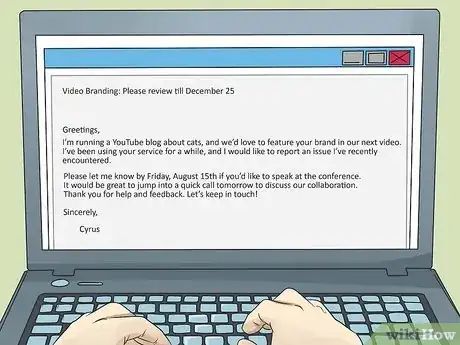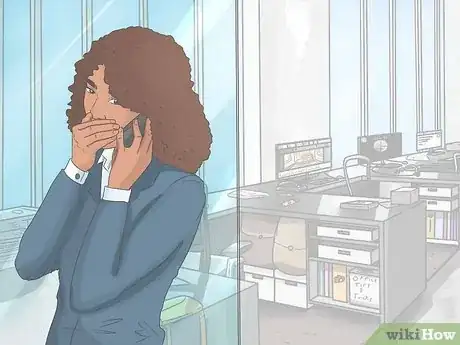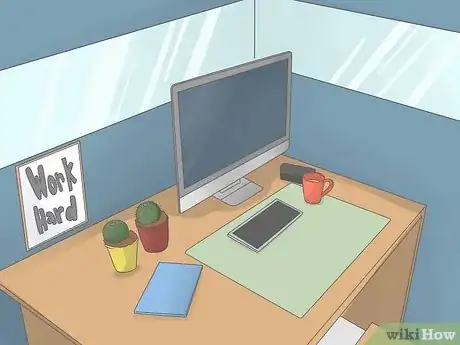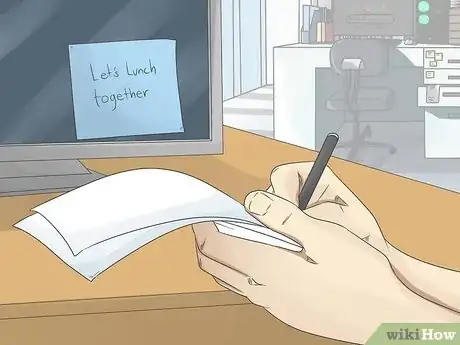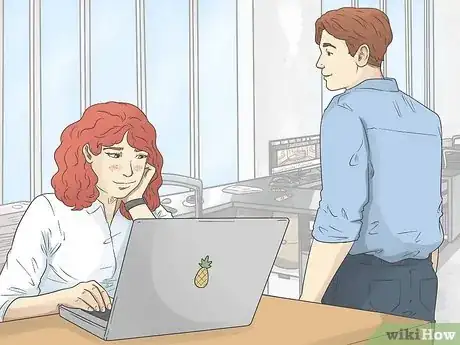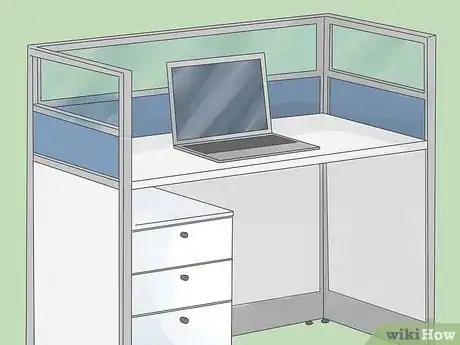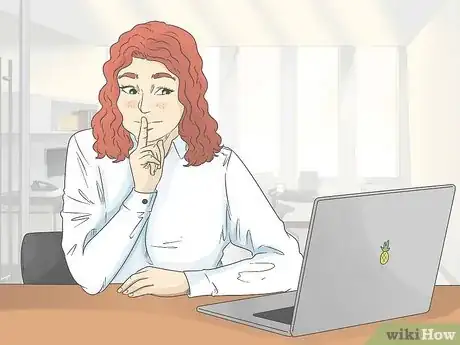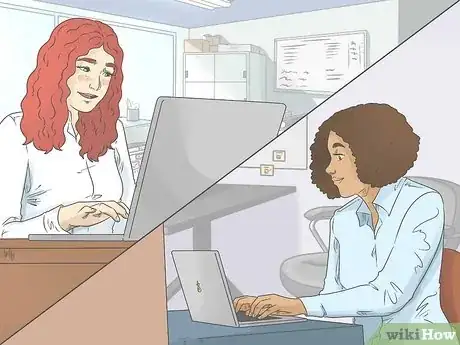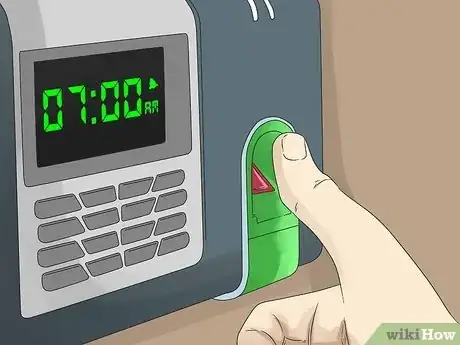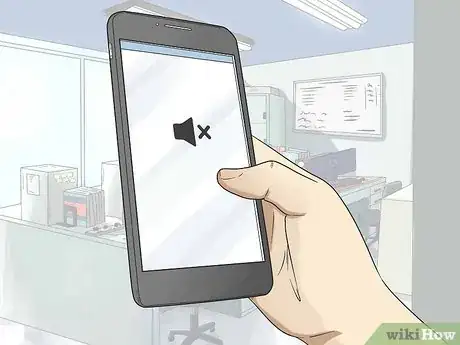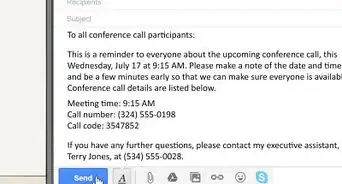This article was co-authored by Meredith Walters, MBA. Meredith Walters is a Certified Career Coach who helps people develop the skills they need to find meaningful, fulfilling work. Meredith has over eight years of career and life coaching experience, including conducting training at Emory University's Goizueta School of Business and the US Peace Corps. She is a former Member of the Board of Directors of ICF-Georgia. She earned her coaching credentials from New Ventures West and a Master of Business Administration from the University of San Francisco.
wikiHow marks an article as reader-approved once it receives enough positive feedback. In this case, several readers have written to tell us that this article was helpful to them, earning it our reader-approved status.
This article has been viewed 398,416 times.
Good workplace manners are the glue that hold the happiest companies together. With good office etiquette, you’ll feel comfortable around your coworkers and make a great impression on your supervisor. Your workplace will feel like a second home in no time!
Steps
Practicing Personal Workplace Habits
-
1Dress appropriately. Every workplace has a slightly different dress code, but in general, avoid wearing clothes that are revealing, overly casual or too loose or tight. If you’re not sure what your office’s dress code is, ask a friendly coworker or your boss, and observe what others wear. It may be acceptable to wear nice jeans, or you may want to stick to slacks, button-down shirts and blouses, and skirts. Determine what your dress code is and stick to it![1]
- You can still buy nice work clothes if you’re on a budget by mixing and matching coordinating styles and buying at off-the-rack stores.
-
2Avoid overpowering perfume or cologne. You and your coworkers are probably in close quarters so keep your office scent subtle. You don’t want it to irritate anyone’s nose or even give them an allergic reaction. If you choose to wear a scent, dab only small amounts on your pulse points, like your wrists, and not on your clothing.[2]Advertisement
-
3Stay home when you’re sick. Use up those sick days when you have them! You may feel guilty about losing a day of work, but taking the day off will help you recover faster and prevent you from exposing the rest of the office to your illness.[3]
- Even if you’re not contagious, your constant coughing or nose-blowing could distract your coworkers, meaning that the whole office is unproductive and annoyed. Save everyone the trouble, grab some medicine and take the day off.
-
4Be polite over email. Keep your emails polite, concise and to the point. Avoid discussing private matters, like a client’s financial information, and speaking badly of any of your coworkers. With a simple click of the “Forward” button, your email can be shared with the whole company, so make sure everything in it is polite and professional.[4]
- Keep your language workplace appropriate. Save the emojis and exclamation points for texts with friends!
-
5Keep your social media appropriate. Even if you have your social media set to private, your coworkers and even your boss will find a way to see it if they want to. Before you post, ask yourself, “Is this something I don’t mind my boss seeing? Is posting this worth sacrificing the respect of my employer, or losing my job?” Avoid overly raunchy posts or pictures with drugs or alcohol, especially if you’re under the legal drinking age.[5]
-
6Eat in the lunchroom or outside. This is especially important if you’re eating strong-smelling foods. It’s fine to heat up your leftover fish in the microwave, but find a place to eat it where it won’t disturb your coworkers. If it’s a nice day, sit outside. Otherwise, head for the lunchroom or an empty conference room.[6]
- Even the sound of chewing, crunching or slurping can be annoying to some noise-sensitive coworkers. Respect their preferences and enjoy your meal outside the office.
-
7Don’t take other people’s food from the communal lunch area. It can be tough to tell when food is communal or personal, especially if it’s in an open container or is sitting in the middle of the fridge. Err on the side of caution; if it’s not clearly marked as something that’s free for the taking, leave it alone. There’s no faster way to ruin a coworker’s day than by eating their lunch!
- Pack your own lunch in a bag or container and attach a sticky note with your name on it to avoid confusion.
- If you do accidentally take someone else’s food, be honest and own up to it. Say, “I’m so sorry that I ate your salad. I thought it was someone’s leftovers they were giving away. Let me go buy you another one.”[7]
-
8Avoid office gossip. Cubicle walls are thin and if you talk badly about a coworker, chances are it will find its way back to them, no matter how large your office is. If you’re frustrated with your boss and need to vent, do so outside of work.[8]
- If it coworkers invite you to gossip, say, “I’ve got to get back to my desk, I’m so swamped right now!”
- As much as you dislike your boss or coworker now, it’ll be much worse if word gets back to them that you were talking about them behind their backs.
Respecting Cubicle Space
-
1Take phone conversations in a private room. This shows that you respect your coworkers’ working environment and don’t want to distract them with your conversations, whether personal or work-related. Cubicle walls are pretty thin, so if you think your conversation will last more than a minute or two, it’s best to take it outside.
-
2Decorate your cubicle simply and tastefully. A neat cubicle shows your boss and coworkers that you respect your work and your working environment. Keeping your space clean, organized, and decorated will make it feel welcoming and friendly. Hang up pictures of your family or good friends. [9]
- Steer clear of anything political as well as offensive pictures, posters, or slogans.
- If you’re not sure if something is appropriate or not, ask yourself if you’d be comfortable with the president of the company seeing it in your cubicle. If the answer is no, take it down and use it to decorate your home instead.
-
3“Knock” before you talk. Be respectful of your coworkers’ time. If you need to talk with them and don’t have a scheduled meeting, knock on the side of their cubicle before you start to speak, as they may be deep in concentration, or even on the phone. When they look up, say, “Do you have a second to chat?” If they’re busy, make plans to talk later, or ask them to come by your cubicle when they’re free.[10]
- Avoid lingering too long at a coworker’s desk, especially if they seem busy. They’d love to hear about your weekend plans at lunch, but not when they’re in the middle of an important email.
-
4Leave a note if a coworker is busy or away from their desk. Write down what you want to talk about on a sticky note and put it on the desk where your coworker will see it, but not right in front of their nose if they’re sitting there. Ask them to swing by your cubicle when they have a second.
- If the coworker is clearly on a call, don’t distract them by whispering or using your hands to communicate. Be patient and leave a note or come back later when they’re off the call.
-
5Ask before you borrow any items. Most offices have a communal pool of the usual office supplies, like staples, post-it notes, pens, and notepads. If you need a tool that only your coworker has, be sure to ask before you bring it back to your desk.[11]
- If you need an item immediately, leave a note on their desk saying, “Borrowed the hole-punch for a couple minutes. I’ll return as soon as I’m done!” Sign your name so they know who to find if their hole-punch never makes it back.
-
6Use your cubicle for working, not personal time. It looks unprofessional if you use your cubicle as a dressing room or a place for personal grooming, like doing your makeup or flossing your teeth. Take your toothbrush and nail clippers to the bathroom and touch up your makeup without your cubicle-mates giving you weird looks--it’ll be more comfortable that way anyways![12]
Using Good Etiquette in an Open Office
-
1Respect your coworkers’ space. This is even more important in an open office environment where there’s not much separating you from your coworkers. Don’t let your paper or work items spill onto someone else’s space and make sure to ask before using something on someone else’s desk, even if it’s just a stapler or a piece of paper.
-
2Be neat and limit personal items to your space. When your desk is out in the open or even shared with other coworkers, it’s even more important to keep it tidy, since it could affect your coworkers’ ability to focus. Limit yourself to only one or two non-work related pictures or items. Keep your paperwork in neat piles or organized into folders.[13]
-
3Be tolerant of other personalities. An open-office space will bring you in close contact with lots of other personalities, which is great for fostering new ideas and getting to know lots of people. On the flipside, it can be stressful to be at the same desk all day with a coworker you don’t like. Keep an open mind and concentrate on learning from other people’s perspectives, even if you don’t always agree with them.[14]
-
4Keep noise to a minimum. Take phone calls outside or in a conference room, especially personal ones or conversations you think could last for a while. Listen to music with headphones, never out loud, and avoid yelling across the room or talking loudly. It can be fun to work in a big room with all your coworkers, but you don’t want to make the environment so loud that no one can focus and get their work done.[15]
-
5Ask your coworkers if they have a second before you start talking. It’s all too easy to disrupt coworkers’ workflow when you’re sitting right across from them. To avoid pestering someone who’s in deep concentration, say quietly, “Hey, do you have a second to talk about this project?” That way, they can finish up what they’re working on before they start meeting with you.[16]
- If your office uses an online messaging service, you could ping them that way as well, or leave a post-it note on their desk if they seem particularly busy.
-
6Keep casual or personal conversations to a minimum. A benefit of an open office workspace is being able to strike up casual conversations with the coworkers around you. If you chat for too long, though, other people will get distracted--and probably a bit annoyed! Save longer conversations for lunchtime or after work.
Being Polite during Meetings
-
1Show up on time. Your coworkers and supervisors won’t be happy if they have to hold up a whole meeting because you got lost on the way to the conference room, or needed a drink of water! Keep your meetings organized on a calendar and stop working ten minutes before so you can gather all the materials you’ll need. Confirm that you know where the meeting is and take a quick bathroom break before you head in.[17]
-
2Silence your cell phone, or turn it off. A cell phone ringing in the middle of a meeting is even worse than one going off in a movie theater! Make sure yours is on silent or turned off before the meeting starts, or leave it in a locked drawer at your desk to avoid the distraction altogether.[18]
-
3Give the speaker your full attention. Close your laptop and set aside your phone--no multi-tasking here! Listen attentively and take notes on a notepad if it helps you pay attention. Active listening and participation in a meeting is polite and shows that you care about the information. When it’s your turn to present or lead a meeting, people will return the favor.[19]
-
4Hold meetings in a conference room, not your desk. If you’re meeting with two or more people, head for a conference room or break area so you won’t distract those working around you. You could even head outside for a walking meeting, or to talk over lunch.[20]
-
5End meetings on time. Keeping your meetings efficient and productive will show that you respect your coworkers’ time, getting them out on time and freeing up the conference room for the next group to get started. Remember, your coworkers are just as busy as you are!
Expert Q&A
-
QuestionHow can I make a good first impression at work?
 Meredith Walters, MBAMeredith Walters is a Certified Career Coach who helps people develop the skills they need to find meaningful, fulfilling work. Meredith has over eight years of career and life coaching experience, including conducting training at Emory University's Goizueta School of Business and the US Peace Corps. She is a former Member of the Board of Directors of ICF-Georgia. She earned her coaching credentials from New Ventures West and a Master of Business Administration from the University of San Francisco.
Meredith Walters, MBAMeredith Walters is a Certified Career Coach who helps people develop the skills they need to find meaningful, fulfilling work. Meredith has over eight years of career and life coaching experience, including conducting training at Emory University's Goizueta School of Business and the US Peace Corps. She is a former Member of the Board of Directors of ICF-Georgia. She earned her coaching credentials from New Ventures West and a Master of Business Administration from the University of San Francisco.
Certified Career Coach Try to be curious during your first few weeks at a new job. Ask questions if you have them and don't assume you know everything. At the same time, don't act like you know nothing at all. It's a delicate balance! It also helps to just kind of sit back and observe during your first few weeks. Figure out what the culture at your job is like. This will give you a better sense for how you can impress your coworkers and managers.
Try to be curious during your first few weeks at a new job. Ask questions if you have them and don't assume you know everything. At the same time, don't act like you know nothing at all. It's a delicate balance! It also helps to just kind of sit back and observe during your first few weeks. Figure out what the culture at your job is like. This will give you a better sense for how you can impress your coworkers and managers. -
QuestionHow do you communicate better at work?
 Meredith Walters, MBAMeredith Walters is a Certified Career Coach who helps people develop the skills they need to find meaningful, fulfilling work. Meredith has over eight years of career and life coaching experience, including conducting training at Emory University's Goizueta School of Business and the US Peace Corps. She is a former Member of the Board of Directors of ICF-Georgia. She earned her coaching credentials from New Ventures West and a Master of Business Administration from the University of San Francisco.
Meredith Walters, MBAMeredith Walters is a Certified Career Coach who helps people develop the skills they need to find meaningful, fulfilling work. Meredith has over eight years of career and life coaching experience, including conducting training at Emory University's Goizueta School of Business and the US Peace Corps. She is a former Member of the Board of Directors of ICF-Georgia. She earned her coaching credentials from New Ventures West and a Master of Business Administration from the University of San Francisco.
Certified Career Coach Focus your full attention on your coworkers when they're talking, whether one-on-one or in meetings. Take notes about what your coworkers are saying so you fully understand. Don't use your phone or computer while you're listening to someone, and don't try to multitask.
Focus your full attention on your coworkers when they're talking, whether one-on-one or in meetings. Take notes about what your coworkers are saying so you fully understand. Don't use your phone or computer while you're listening to someone, and don't try to multitask. -
QuestionHow do I get along with coworkers?
 Meredith Walters, MBAMeredith Walters is a Certified Career Coach who helps people develop the skills they need to find meaningful, fulfilling work. Meredith has over eight years of career and life coaching experience, including conducting training at Emory University's Goizueta School of Business and the US Peace Corps. She is a former Member of the Board of Directors of ICF-Georgia. She earned her coaching credentials from New Ventures West and a Master of Business Administration from the University of San Francisco.
Meredith Walters, MBAMeredith Walters is a Certified Career Coach who helps people develop the skills they need to find meaningful, fulfilling work. Meredith has over eight years of career and life coaching experience, including conducting training at Emory University's Goizueta School of Business and the US Peace Corps. She is a former Member of the Board of Directors of ICF-Georgia. She earned her coaching credentials from New Ventures West and a Master of Business Administration from the University of San Francisco.
Certified Career Coach Try to keep an open mind and see things from their perspectives. Everyone is different, so be open to other peoples' personalities.
Try to keep an open mind and see things from their perspectives. Everyone is different, so be open to other peoples' personalities.
References
- ↑ https://www.forbes.com/sites/lisaquast/2014/04/07/office-etiquette-tips-to-overcome-bad-manners-at-work/#40fc32b24a37
- ↑ http://www.townandcountrymag.com/society/a10276858/office-etiquette/
- ↑ http://www.townandcountrymag.com/society/a10276858/office-etiquette/
- ↑ https://www.inc.com/guides/2010/06/email-etiquette.html
- ↑ http://www.townandcountrymag.com/society/a10276858/office-etiquette/
- ↑ https://www.washingtonpost.com/business/capitalbusiness/career-coach-15-rules-of-etiquette-for-the-cubicle/2011/08/10/gIQARJKXFJ_story.html?utm_term=.6f085d4a6cb7
- ↑ https://www.forbes.com/sites/lisaquast/2014/04/07/office-etiquette-tips-to-overcome-bad-manners-at-work/#40fc32b24a37
- ↑ https://www.forbes.com/sites/lisaquast/2014/04/07/office-etiquette-tips-to-overcome-bad-manners-at-work/#40fc32b24a37
- ↑ https://www.washingtonpost.com/business/capitalbusiness/career-coach-15-rules-of-etiquette-for-the-cubicle/2011/08/10/gIQARJKXFJ_story.html?utm_term=.6f085d4a6cb7
- ↑ https://www.washingtonpost.com/business/capitalbusiness/career-coach-15-rules-of-etiquette-for-the-cubicle/2011/08/10/gIQARJKXFJ_story.html?utm_term=.6f085d4a6cb7
- ↑ https://www.washingtonpost.com/business/capitalbusiness/career-coach-15-rules-of-etiquette-for-the-cubicle/2011/08/10/gIQARJKXFJ_story.html?utm_term=.6f085d4a6cb7
- ↑ https://www.washingtonpost.com/business/capitalbusiness/career-coach-15-rules-of-etiquette-for-the-cubicle/2011/08/10/gIQARJKXFJ_story.html?utm_term=.6f085d4a6cb7
- ↑ https://www.entrepreneur.com/article/276238
- ↑ Meredith Walters, MBA. Certified Career Coach. Expert Interview. 22 November 2019.
- ↑ https://www.entrepreneur.com/article/276238
- ↑ https://www.entrepreneur.com/article/276238
- ↑ https://www.forbes.com/sites/lisaquast/2014/04/07/office-etiquette-tips-to-overcome-bad-manners-at-work/#40fc32b24a37
- ↑ https://www.forbes.com/sites/lisaquast/2014/04/07/office-etiquette-tips-to-overcome-bad-manners-at-work/#40fc32b24a37
- ↑ Meredith Walters, MBA. Certified Career Coach. Expert Interview. 22 November 2019.
- ↑ https://www.forbes.com/sites/lisaquast/2014/04/07/office-etiquette-tips-to-overcome-bad-manners-at-work/#40fc32b24a37
About This Article
To show good workplace manners, try to be respectful of everyone’s space by keeping food and personal phone calls in the breakroom. If you’re sick, ask for a day off so your coworkers don’t catch something. Make sure you’re concise and polite when sending emails, and don’t use them to discuss private information. Workplaces are small, so avoid gossiping about other coworkers. To make sure everyone feels comfortable, wear outfits that fit well and match your company’s dress code. For tips on having good manners in cubicles and open spaces, read on!



